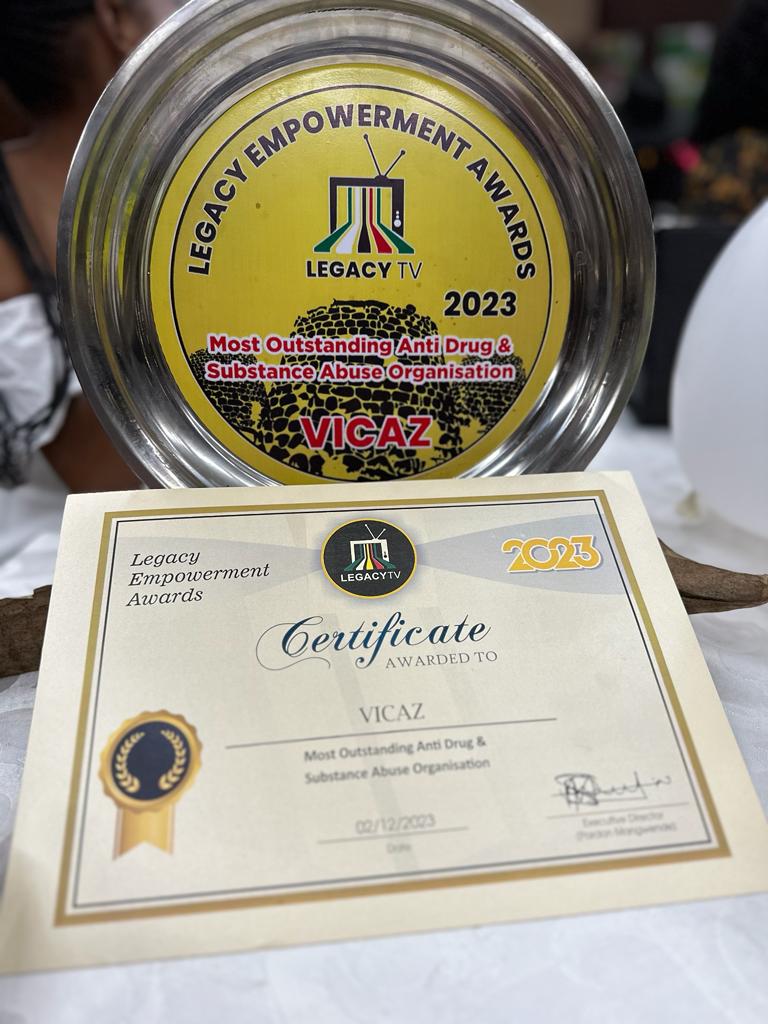|
Getting your Trinity Audio player ready…
|
Writes Rebecca Munetsi
The Visionary Cadres Association of Zimbabwe (ViCAZ) is appealing to youths to refrain from abusing drugs and alcohol during this festive season.
Registered under the Zimbabwe Youth Council in the Health and Social Welfare Sector, the organization recently won an award for being the most recognized organization taking an active role in the fight against drugs and substance abuse in the country.
Speaking about the Legacy TV award, ViCAZ Chairman, Mr Onwell Sisimayi said, “We are proud to win this award and it’s a win for every ViCAZ member. The award has propelled us to work extra hard. That is why we urge all youth to desist from abusing alcohol and drugs as festivities bring along a lot of excitement and trying of new things among the youth”.
Mr. Sisimayi said the youth account for the bigger percentage of Zimbabwe’s human resources. He said that drugs and substance abuse are a threat to the achievement of Vision 2030 through NDS1 and NDS2.
Globally, the UN Office on Drugs and Crime (UNODC), World Drug Report 2023, says in 2021, over 296 million people used drugs, an increase of 23 percent over the previous decade. This has seen the number of people who suffer from drug use disorders increased to 39.5 million, a 45 percent increase over 10 years.
Young people are the most vulnerable to drugs due to the economic crisis brought about by the COVID-19 pandemic. In Africa, 70 percent of people in treatment are reported to be under the age of 35.
Anecdotal evidence in Zimbabwe suggests that youths’ abuse of drugs and substances is rife with most youth identified to be in a drunken stupor ‘vakasticker’ and using mostly crystal meth known as mutoriro, methamphetamine cough syrups containing codeine and marijuana among others.
The Visionary Cadres Association of Zimbabwe says it is focused on fighting drugs and substance abuse by running awareness campaigns, roadshows, and engaging the government through ministries. It also involves the corporate world and engages with the transport sector on how best the country can eradicate the menace.
“In each and every community, we aim to have at least 13 committed members liaising with the ViCAZ National team through the provincial leaders. I believe everyone has been affected directly or indirectly by this prevailing scourge, which is now a threat to the economic development of the nation. We seek to unite in this fight against drug abuse for it knows no party, colour or creed,” says Sisimayi.
In response to both increases in drugs and substance abuse, the government has notably responded with a lot of initiatives. The Zimbabwe National Drug Master Plan (2020–2025) provides a comprehensive and integrated approach to address the rise in substance use in the country. The Dangerous Drugs Act (15:02) controls the importation, exportation, production, sale, distribution and use of dangerous drugs. The establishment of a three-tier Committee at the National Level, Inter-ministerial Taskforce on Drug and Substance Abuse, Working Party of Officials, Technical Working Group and Provincial Inter-ministerial Taskforces in all the 10 Provinces.
Recently, ViCAZ entered into partnership with the Ministry of Public Service, Labour and Social Welfare in fighting drug and substance abuse. Secretary for Public Service, Labour and Social Welfare, Mr Simon Masanga, says ViCAZ is welcome to partner with the National Committee on Drugs and Substances in the fight against drugs and substance abuse.
ViCAZ activities fall under the Demand Reduction pillar. Efforts are aimed at reducing the public desire for illegal drugs through a variety of activities which include advocacy, awareness, and vocational skills training.
In the current national budget, Prof Muthuli Ncube also increased the budget vote for the Ministry of Youth Empowerment Development and Vocational Training by an additional $50 billion to help in fighting drug and substance abuse and attending vocational training. The comprehensive approach of ViCAZ aims to make a significant and lasting impact in the country and on individuals affected by drugs and substance abuse in the communities they belong to.
